Well I remember that night—and the hour of illumination. We were heart-broken, we were in despair. We sought signs and could find none. The dead remained dead to us and no answer came to all our crying.
It was a sullen August evening, and after we had dined we walked upon the shore, listening to the slow surge of the waves and watching the lightning flicker from the bosom of a distant cloud. In silence we walked, till at last Leo groaned—it was more of a sob than a groan—and clasped my arm.
“I can bear it no longer, Horace,” he said—for so he called me now—“I am in torment. The desire to see Ayesha once more saps my brain. Without hope I shall go quite mad. And I am strong, I may live another fifty years.”
“What then can you do?” I asked.
“I can take a short road to knowledge—or to peace,” he answered solemnly, “I can die, and die I will—yes, tonight.”
I turned upon him angrily, for his words filled me with fear.
“Leo, you are a coward!” I said. “Cannot you bear your part of pain as—others do?”
“You mean as you do, Horace,” he answered with a dreary laugh, “for on you also the curse lies—with less cause. Well, you are stronger than I am, and more tough; perhaps because you have lived longer. No, I cannot bear it. I will die.”
“It is a crime,” I said, “the greatest insult you can offer to the Power that made you, to cast back its gift of life as a thing outworn, contemptible and despised. A crime, I say, which will bring with it worse punishment than any you can dream; perhaps even the punishment of everlasting separation.”
“Does a man stretched in some torture-den commit a crime if he snatches a knife and kills himself, Horace? Perhaps; but surely that sin should find forgiveness—if torn flesh and quivering nerves may plead for mercy. I am such a man, and I will use that knife and take my chance. She is dead, and in death at least I shall be nearer her.”
“Why so, Leo? For aught you know Ayesha may be living.”
“No; for then she would have given me some sign. My mind is made up, so talk no more, or, if talk we must, let it be of other things.”
Then I pleaded with him, though with little hope, for I saw that what I had feared for long was come to pass. Leo was mad: shock and sorrow had destroyed his reason. Were it not so, he, in his own way a very religious man, one who held, as I knew, strict opinions on such matters, would never have purposed to commit the wickedness of suicide.
“Leo,” I said, “are you so heartless that you would leave me here alone? Do you pay me thus for all my love and care, and wish to drive me to my death? Do so if you will, and my blood be on your head.”
“Your blood! Why your blood, Horace?”
“Because that road is broad and two can travel it. We have lived long years together and together endured much; I am sure that we shall not be long parted.”




